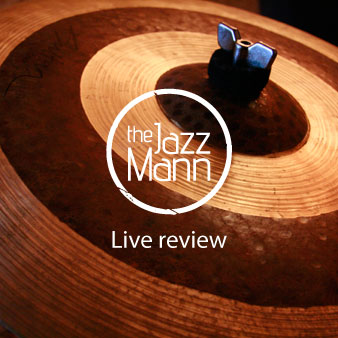
by Tim Owen
August 19, 2009
/ LIVE
If Erik Satie ever played free music it might have sounded like this
Paul Dunmall is one of the most compelling musicians the British Isles have produced, so any unit featuring his sax is always of interest. But the partnership with a pianist of the calibre of Matthew Bourne made this gig particularly promising. Some of the best traces of Dunmall’s past work reside in recordings made alongside Keith Tippett in Mujician, and what I’ve seen and heard of Bourne in various contexts held out the promise of another special union.
Bourne has previously played multimedia shows with Spring Heel Jack and solo sets spliced with spoken word samples, organised the ‘Songs from a Lost Piano’ project in which junkshop uprights were dusted off for performance, and briefly convened a Fender Rhodes-dominated quintet, The Electric Dr M. In this light he promised to be an intriguing match with Dunmall, whose early sessionography - and subsequent role as owner of the Duns Limited Edition label - demonstrates an affinity for folk music as much as jazz. I wasn’t sure what to expect from this quartet; I certainly didn’t expect to arrive at the Vortex in the midst of a barrage of free jazz, with Dunmall in full cry and Bourne raining down cascades of notes upon the keyboard.
Any fears that this unit was going to deal squarely in unleavened post-Trane improvisation were soundly disabused by the next piece, which began with Bourne’s solo piano. If Erik Satie ever played free music it might have sounded like this; it’s a lazy analogy perhaps, but apposite. Bassist Dave Kane joined in with textural arco while simultaneously rubbing the strings, producing friction so soft it was probably only audible to the front row. Bourne’s playing gained speed and intensity until joined by Davis’ drums and Dunmall’s soprano sax. Where I expected complementary textural playing from Dunmall he produced instead a contrasting skein of melody, shaping the piece as it accumulated further mass until, eventually, Bourne dropped out to leave the intensely active sound field refreshingly uncluttered. He re-entered just before the conclusion: a rapid and neatly executed diminution and release of tension.
Bourne also got the second set underway, with rapid slaps and tweaks inside the piano that were echoed on Kane’s fretboard and Davis’ rims. Dunmall’s entry on tenor was deceptively tentative, but Kane responded with abrasive arco, driving the piece forwards in agitated mood. Davis found a characteristically sprightly, tightly integrated pulse, which he accented in staccato fashion. ?Chiming’ strikes on the piano’s wires acted as if to put a brake on the band’s momentum, but as the others reached a kind of stasis Dunmall’s sax grew increasingly melodic. The piece concluded with a lovely duet from Bourne and Dunmall.
The next piece started with a tightly controlled bass solo, and Bourne stayed out as a strong feature for soprano sax trio developed, Dunmall increasingly harsh in the tonal range of a clarinet, with Eastern overtones. Bass and drums agitated for combustion, and Davis took a brief solo that ignited from Bourne a sequence of rapid figures in a narrow mid range, gradually broadening out. Kane interjected a one-note bass drone, switching to arco as the piano trio gained momentum. By the time Dunmall entered on tenor the collective intensity rivalled that of Sun Ship-era Coltrane. In such passages the authority borne of experience inherent in Dunmall was evident, as he steered the band through the turbulence, controlling the collective tension and release by modulating the power and forcefulness of his playing. As before, the piece was resolved crisply, with a sweet piano coda.
A final piece started with a tenor sax solo that led to discursive saxophone- and piano-trio passages, though the ultimate full band union was unexpectedly dolorous. Dunmall’s sax probed avenues for further melodic development, locking onto and developing the most promising. Bourne’s playing became contrastingly abrasive, a mood the others picked up on as agitation mounted, and the concert closed on a note of intense finality.
Dunmall has scored another recent critical success with the Profound Sound Trio, featuring the heavyweight American bass/drums partnership of Henry Grimes and Andrew Cyrille. I haven’t yet had the privilege of seeing that unit live but I have listened closely to the recording, and fine as it is I think the quartet with Bourne, Kane and Davis has the edge, certainly when it comes to freshness of conception. I can certainly recommend their own CD, Moment to Moment (SLAM, 2009; recorded live in June 2008), which features pieces readily identifiable from the Vortex show such as the second set opener, Voluntary Expressions.
blog comments powered by Disqus